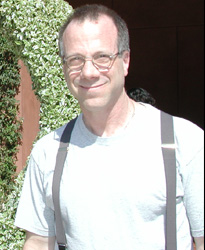
Interviewed by: Isaac Lew and Trisha Kunimoto
Written by: Trisha Kunimoto
Akadot had the opportunity to meet with Frank Gladstone of DreamWorks Pictures regarding the upcoming domestic release of the feature film Millennium Actress. Millennium Actress is the first Japanese animation title DreamWorks will distribute, and Gladstone tells Akadot why this particular film over all the other untouched animation titles was chosen. Gladstone also shares his experiences working in America's animation industry and his thoughts about Japanese animation. Akadot: Have you seen any of Satoshi Kon's earlier works, for example Perfect Blue? Frank Gladstone: Yes, but I didn't see it until after I saw Millennium Actress. I didn't know that was out actually. Perfect Blue is very absorbing, a kind of a "Hitchcock" type of film. I hadn't known anything about it before I actually viewed it and was surprised. It is very violent, and has lots of sex in it; not exactly pleasant sex either. But, while Millennium Actress does not contain the sex and violence of Perfect Blue, it does share some of the same themes and I thought it was a great movie. Perfect Blue is the kind of movie you have to tell people about before they go in because if they are expecting a cartoon, they are not going to see that. It's obvious to me, even though I saw Perfect Blue after Millennium Actress, that Satoshi Kon is a filmmaker to be reckoned with. Akadot: Perfect Blue has already been released in America, but only a small audience such as anime fans in general have seen it. How do you think this movie will go? Do you think your audience will be mostly anime fans since it has the title "anime" or how do you plan reach out beyond that level? Also, since the cultural aspect is so strong (Japanese history, setting, etc...) in this film, do you find that as another obstacle? FG: I don't know how it will happen, but I think, initially, that all the otaku are going to see this because of websites and everyone talking about it. It also won a big award in Japan, along with Spirited Away, and people who follow anime are going in expecting it to be great. So that audience [anime fans] will be there and they are going to want to see it. But, the idea is that everyone (which includes everyone in Japan and America) wants this crossover thing to happen. My hope for Millennium Actress is that it will get good reviews, which I think it will. Good reviews from mainstream reviewers may begin to open up a wider audience. That would be good because I think this kind of movie does speak to an audience that may be not interested in mecha films or in kind of stylized Sailor Moon or Akira type science fiction. This film has a kind of practical outlook and happens in places we understand. Maybe people who don't normally go to see anime screenings may take a flyer and see this one if the reviews are good. As for the Japanese cultural aspect, when the film was brought to us in the first place, there was a bit of a worry that we wouldn't understand historical aspects like the Manchurian revolution, for instance. But there was no need to be concerned. When watching the movie, I don't think anyone will be confused by Japanese historical context. They may not know all the history, but they will grasp the big points; that this sequence represents a "revolution" or that sequence is set during World War II and the American soldiers are there. They will understand enough of the inferences to keep the story moving along. Nobody will have to stop and think, "Where is she now?" That's what so brilliant about this picture. Even though it shifts back and forth like that and it may represent things that a western person may not be knowledgeable about in Japanese history, it will not matter. The themes are broad enough and the audience will understand, "Oh, she's running around because they have been invaded." It's fine. In fact, I am very pleased that Satoshi Kon and Sadayuki Murai did not "write down" to their audience. The context and subtext of the film was easy to follow. It just flowed right through. Akadot: Because the theme is universal, right? FG: Absolutely. Somebody's looking for love. Tah-dah! [Laughs] And she has a very interesting life. That's great. And there's enough humor in it and enough desire and identification, that everyone can relate. Everybody looks for that. The incidental historical events that create a tapestry behind the characters are first-rate. They are fascinating. You get it. Akadot: So it can even trigger someone to even become interested in Japanese culture? FG: Yes. I mean, when we go see an Eastern culturally based drama like Crouching Tiger, Hidden Dragon, nobody thinks, "Oh, I have to know such-and-such dynasty to understand the movie." Audiences know that it's about a time in history, that there are certain cultural rules that will be explained. Then you kind of learn through the movie why the characters are in love, but they the love cannot be fulfilled. That creates, in a way, the same kind of theme of unrequited love that Millennium Actress deals with. Everybody gets that. So the audience may not even know what dynasty is in place or what invasion or revolution is happening. All that is necessary is that you know that the characters are putting up with trouble and you hope that they can get through it and survive. |
